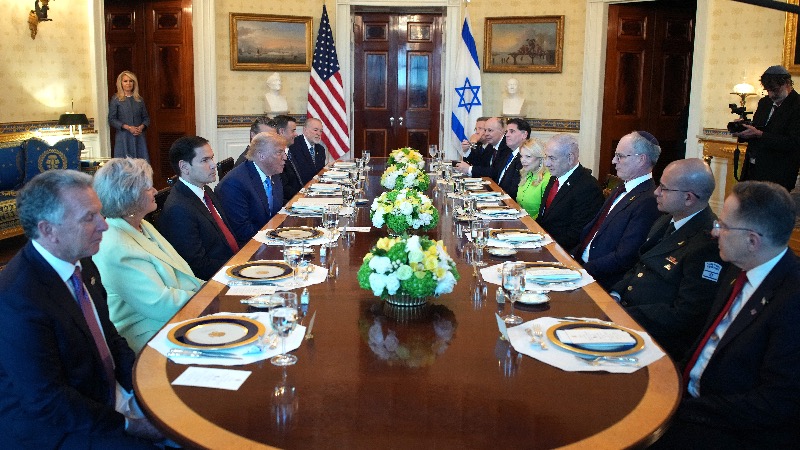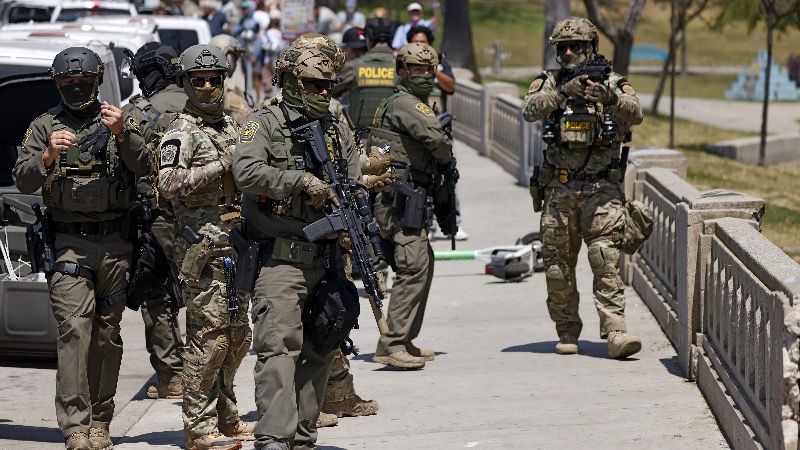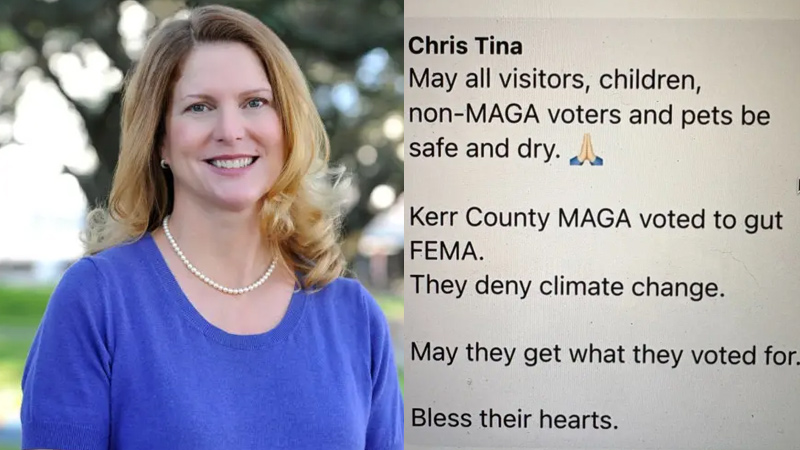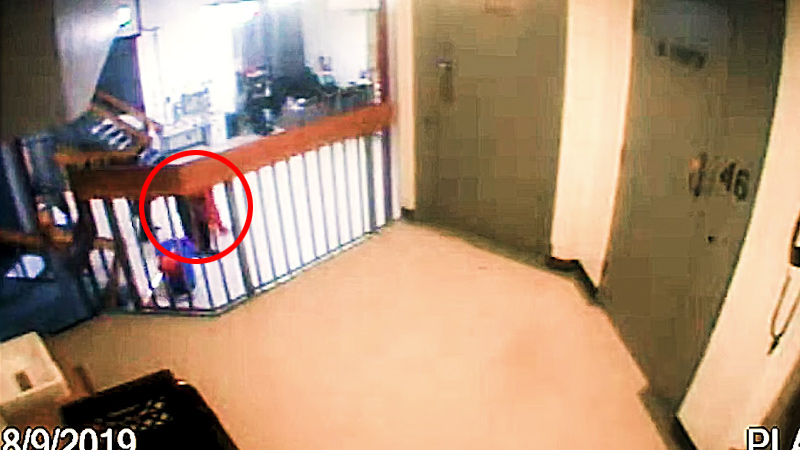 Image Credit: Andrew Harnik / Staff / Getty
Image Credit: Andrew Harnik / Staff / Getty On Monday evening President Donald Trump met with Israeli Prime Minister Benjamin Netanyahu at the White House to discuss a Gaza ceasefire deal. Earlier in the day Netanyahu met with Secretary of State Marco Rubio and Steve Witkoff, Trump’s Middle East advisor.
Netanyahu said that he believes he can work out a peace with the “entire Middle East” thanks to Trump’s leadership, a peace which would include allowing Palestinians the power to govern themselves while keeping security matters under Israel’s control forever.
Trump held his ongoing policy stance of peace during the discussions, saying that he hopes the conflict is over for good and that he anticipates more diplomatic meetings with Iran into the future.
“I think the Palestinians should have all the powers to govern themselves, but none of the powers to threaten us. That means a sovereign power, like overall security, will always remain in our hands,” Netanyahu said. “We will work out a peace with our Palestinian neighbours, those who don’t want to destroy us and we will work out a peace in which our security, the sovereign power of security, always remains in our hands.”
While Netanyahu is open to Palestine’s self-administration, he does however draw the line at pure national sovereignty.
“Now people will say, ‘It’s not a complete state, it’s not a state, it’s not that.’ We don’t care. We vowed never again. Never again is now. It’s not going to happen again,” the Prime Minister said.
Netanyahu said that Palestinians may be exported to countries willing to take them, commenting that Gaza should not remain an open-air prison.
“If people want to stay, they can stay. But if they want to leave, they should be able to leave. It shouldn’t be a you know, prison, it should be an open place and give people a free choice,” Netanyahu said. “We’re working with the United States very closely about finding countries that will seek to realize what they always say, that they want to give the Palestinians a better future. And those who, and I think we’re getting close to finding several countries, and I think this will do again, the freedom to choose. Palestinians should have it. And I hope that we can secure it close.”
Trump, however, is not indicating that the U.S. will absorb any of these people, instead hinting that nearby countries may absorb the expats.
“We’ve had great cooperation from surrounding, meaning surrounding Israel, surrounding countries. Great cooperation from every single one of them. So something good will happen,” Trump said.
While the dinner was initially reported to be private, a video feed of the meal was streamed live, but has since concluded. During the dinner, Trump explained why he’s taken sanctions off Syria and will like to do the same with Iran.
We took the sanctions off [Syria] because we want to give them a chance … and I would love to be able to — at the right time — take those sanctions off [Iran], give them a chance at rebuilding, because I’d like to see Iran build itself back up in a peaceful manner.
.@POTUS: "We took the sanctions off [Syria] because we want to give them a chance … and I would love to be able to — at the right time — take those sanctions off [Iran], give them a chance at rebuilding, because I'd like to see Iran build itself back up in a peaceful manner." pic.twitter.com/bDU8DLbLNH
— Rapid Response 47 (@RapidResponse47) July 8, 2025
Palestinian journalist Marwan Bishara gave an analysis on AlJazeera regarding the mood of the dinner:
The Israeli prime minister has truly been empowered by his presence in Washington, DC. He probably can’t visit most countries in the world today because he is sought by the International Criminal Court.
But in Washington, he’s being received.
And he appears in no mood or position at this time to back down or back off his rejectionist stance when it comes to Palestinians, or Gaza, or the West Bank.
But I am a bit surprised by one thing. The tone is not as celebratory as I thought it would be. Netanyahu’s wife’s presence at that official meeting was another strange twist, even though it was a private dinner.
Now, clearly, he is non-committal on anything, including what he wants, when he asked point blank after Trump said, ‘We welcome peace with Iran, stability with Iran’, and so forth.
The Israeli prime minister said we will have to wait and see, we need to keep an eye on the Iranian “tumour”, and hence, probably, they’re gonna have to keep at it.
Netanyahu said his meetings with U.S. officials prior to the dinner included substantive and important conversations about the U.S./Israel alliance and how to strengthen it, indicating it may not be as strong as some make it out to be.
“This evening, I met at Blair House in Washington with the U.S. Secretary of State, Marco Rubio. We held a substantive and important conversation about strengthening the alliance between Israel and the U.S., and about the shared challenges we face in the regional and international arena,” the Prime Minister said in Hebrew, translated into English.
הערב נפגשתי בבלייר האוס בוושינגטון עם מזכיר המדינה של ארה״ב, מרקו רוביו.
— Benjamin Netanyahu – בנימין נתניהו (@netanyahu) July 7, 2025
קיימנו שיחה עניינית וחשובה על חיזוק הברית בין ישראל לארה״ב, ועל האתגרים המשותפים לנו בזירה האזורית והבינלאומית. 🇮🇱🤝🇺🇸 pic.twitter.com/ZP2OL9WuxW
The meeting is the third time Netanyahu will meet Trump during his second term in office. Monday’s meeting comes soon after the U.S. strike on Iranian nuclear facilities and an allegedly “euphoric” phone conversation the world leaders had following the military action.
Following that deal Trump got Israel to accept a Gaza ceasefire deal, and Hamas has since signaled their willingness to comply with a new truce.
The President also seeks a “permanent deal” between Israel and Iran. Later this week Witkoff is expected to travel to Qatar’s capital to continue the administration’s push for a ceasefire and hostage deal to end the 21-month onslaught of Gaza.
An evening dinner with Netanyahu Monday evening is notably more causal than a formal diplomatic meeting in the morning.
“It was not immediately clear why Trump was taking a lower-key approach with Netanyahu this time,” Reuters said Monday.
During the dinner the Israeli Prime Minister presented the President with a letter nominating him for the Nobel Peace Prize.
Israeli Prime Minister Benjamin Netanyahu presents President Trump with a letter nominating him for the Nobel Peace Prize pic.twitter.com/JUzpU2ZPYz
— Rapid Response 47 (@RapidResponse47) July 7, 2025


